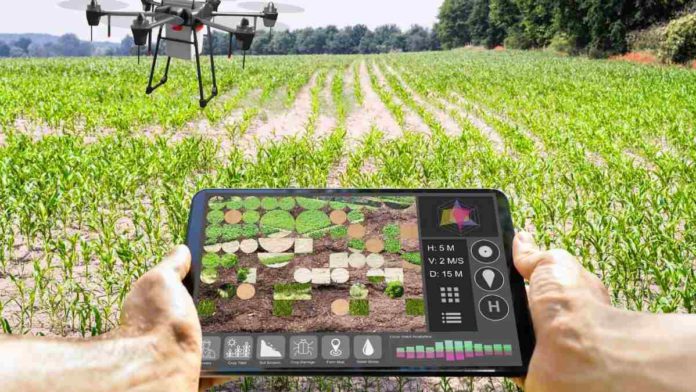Precision agriculture, site-specific crop management, or satellite farming is a farming management concept based on analyzing, measuring, and responding to inter and intra-field variability in crops. Precision agriculture research aims to define a decision support system for entire farm management and optimize returns on inputs while preserving resources.
It includes wind patterns, rain predictions, and other seasonal effects, mapping the field in terms of disparities within the area or other fields around it, the sunlight variation across the year using feeds from weather stations, Remote sensing equipment, GPS, and GIS.
Another critical feature of precision agriculture is having a trained artificial intelligence-powered software module on the specific crop being planned in that field.
Read More: Lollipop AI Launched Online Grocery Marketplace Where Users Can Build Their Own Recipes
This artificial intelligence software has an understanding of the growth patterns of that particular crop, potential diseases that are related to that crop, selection of specific fertilizer or pesticides depending upon the possible infections, and prediction of disease depending upon the growth of leaves, size, and color of the plant.
The technique uses feed sensors, soil sensors, weight sensors, temperature sensors, intensity sensors, and numerous cameras. These sensors may be deployed on a machine. This machine can be a small-sized robot moving across the field.
This robo will have multiple compartments filled with different ingredients required for the plants like pesticides, water, and fertilizers. Based on the real-time feedback of various sensors, the software will scrutinize that information according to the trained artificial intelligence model installed on that robot.
Farmers currently rent out heavy machines for sowing and cutting the crops, they will be able to hire various types of robots for their specific needs. Initially, the cost will be high, but gradually, when this becomes standard practice, the price will reduce considerably with volume and scale.
However, despite all these advantages, artificial intelligence technology also has a few drawbacks representing challenges. Firstly, the most important social challenge is unemployment that could be a threat due to the reduced human interference in the process..
Moreover, some risks and apprehensions could be posed regarding sustainability, especially the massive energy consumption, e-waste problem, market concentration, and job displacement.


